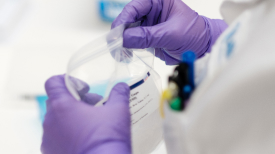- Cancer Care Team
Cancer Care Team
To deliver optimal patient outcomesProducts and Services
Cancer Type
Supplies & Tools
Scientific Focus
- Biopharma Partners
- Patients
- Education & Events
- Login
- Contact Us
Test Details
 Cancer Type
Cancer Type
Breast, Hereditary breast and ovarian, Hereditary cancer, Ovarian
 Technology Used
Technology Used
Molecular, NGS
 Turnaround Time
Turnaround Time
18 - 21 days
Use
According to National Comprehensive Cancer Network,1 testing is indicated if one of the features mentioned below is present in the family: early-age-onset (age <50 years) breast cancer including both invasive and ductal carcinoma in situ (DCIS) breast cancers; two breast primaries or breast and ovarian/fallopian tube/primary peritoneal cancer in a single individual or two or more breast primaries or breast and ovarian/fallopian tube/primary peritoneal cancers in close (first- second- and third-degree) relative(s) from the same side of the family; populations at risk (eg, Ashkenazi Jewish); member of a family with a known BRCA1 or BRCA2 mutation; any male breast cancer; ovarian/fallopian tube/primary peritoneal cancer at any age.
Special Instructions
A BRCAssure® clinical questionnaire should be submitted with specimens. Contact CMBP genetics services at 800-345-4363 to coordinate testing. To order Oragene Dx 500 saliva collection kits using PeopleSoft No. 87917, contact your local Labcorp branch supply department.
Limitations
Technologies used do not detect germline mosaicism and do not rule out the presence of large chromosomal aberrations, including rearrangements, gene fusions, or variants in regions or genes not included in this test, or possible inter/intragenic interactions between variants. Variant classification and/or interpretation may change with time if more information becomes available. False-positive or false-negative results may occur for reasons that include: genetic variants, pseudogene interference, technical handling, blood transfusions, bone marrow transplantation, mislabeling of samples, or erroneous representation of family relationships. For heterozygous variants in the same gene, the assay cannot determine whether they are on the same or a different chromosome; to determine phase and clinical significance, rarely, parental testing may be required. Exact breakpoints of exon-level deletions/duplications are not determined. The presence of an inherited cancer syndrome due to a different genetic cause cannot be ruled out. Any interpretation should be clinically correlated with information about the patient's presentation and relevant family history.
This test was developed and its performance characteristics determined by Labcorp. It has not been cleared or approved by the Food and Drug Administration.
Methodology
Next-generation sequencing: Genomic regions of interest are selected using a custom capture reagent for target enrichment and sequenced via the Illumina® next generation sequencing platform. Regions of interest include all exons and intron/exon junctions (+/-20 nucleotides) of the BRCA1 (NM_007294.3) and BRCA2 (NM_000059.3) genes. Certain regions may be extended to include non-coding sequences known to harbor pathogenic/likely pathogenic variants. Sequencing reads are aligned with the human genome reference GRCh37/hg19 build. Minimum mean coverage is 40X. Any segment failing minimum read depth coverage is rescued by bi- directional Sanger sequencing to complete sequence analysis. Variants, including SNVs and CNVs, are identified using a custom bioinformatics pipeline.
Reported variants: Pathogenic and likely pathogenic variants and variants of uncertain significance (VUS) are reported. Non-deletion variants are specified using the numbering and nomenclature recommended by the Human Genome Variation Society (HGVS). Benign variants are not reported. Variant classification and confirmation are consistent with ACMG standards and guidelines. 2,3 Detailed variant classification information is available upon request. A variant of uncertain significance (VUS) should not be used in clinical decision making; a VUS is classified based on inadequate or conflicting evidence regarding its pathogenicity or clinical relevance.
Related Documents
Specimen Requirements
Information on collection, storage, and volume
Specimen
Whole blood or saliva collected in an Oragene Dx collection kit
Volume
7 mL whole blood, 2.0 mL saliva
Minimum Volume
3 mL whole blood, 0.5 mL saliva
Container
Lavender-top (EDTA) tube or yellow-top (ACD) tube or Oragene Dx 500 saliva collection kit
Storage Instructions
Maintain specimen at room temperature.
Causes for Rejection
Frozen whole blood; serum; leaking tube; clotted blood; grossly hemolyzed specimen; incorrect anticoagulant; saliva collection in incorrect container.
Do not eat, drink, smoke, or chew gum 30 min prior to saliva sample collection. See Oragene Dx 500 saliva kit for detailed instructions.
Collection
Blood draw; saliva collection
Related Tests
Find more tests related to this one.





